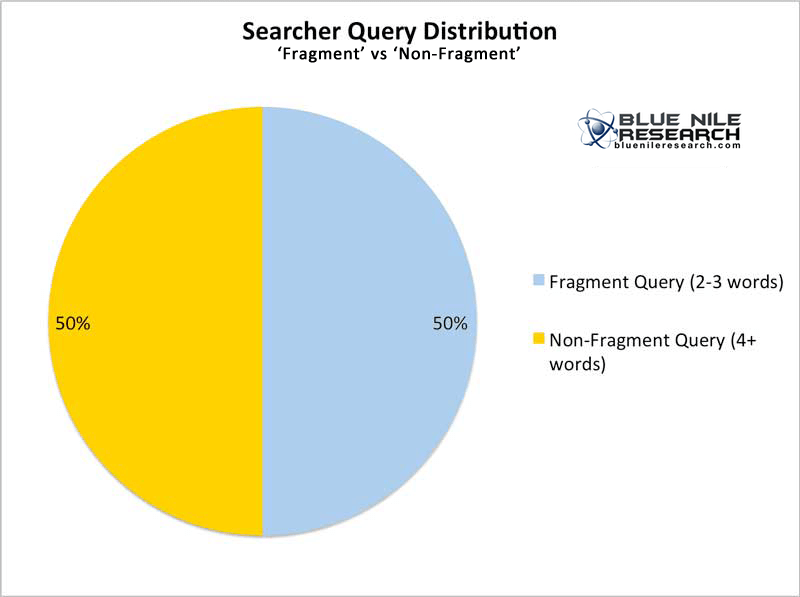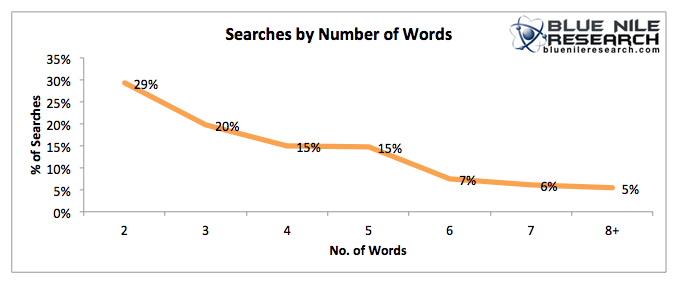Research Reveals The Distinct Ways Users Search
Columnist Nathan Safran shares data and insights from a recent study conducted by Blue Nile Research that may change the way you think about keyword research.
Although it is among the first tasks completed in the search marketing journey, keyword analysis is arguably its most crucial element. The keywords the marketer chooses will go a long way to defining the success of the program, from visits to engagement to revenue.
Traditional keyword research — using data sources such as our own website analytics, keyword tools such as Google Keyword Planner, and external tools such as Ubersuggest — is an important part of a thorough keyword research process.
In reality, however, this only provides an adjacent look at how others might be searching based on our starting term (or in the case of analytics, how searchers are arriving at our website through terms for which we already rank). This is valuable in its own right, but it is ultimately limited in helping us gain a true picture of how searchers might be looking for our product or service.
Looking From A Different Angle
An approach that will give us a very different view of how people actually search is to query a group of users with the same set of scenarios and ask them how they would search in each scenario. This is the approach Blue Nile Research recently took in a research study, Psychology of the Searcher: Patterns in How Searchers Formulate Queries. (Full disclosure: I am Blue Nile’s CEO and founder.)
The study asked searchers to imagine three different scenarios and queried them as to how they would search in each scenario:
- Technology Problem: Coffee maker does not turn on
- Health Problem: Swollen ankle
- E-commerce: In the market for a new laptop
Rather than depending on a tool to tell us searches adjacent to our starting term (an approach that is limited both by the technology and our own assumptions about how people search), this approach goes right to the source and asks a set of respondents about how they would search in each scenario. This approach left us with a rich set of data for analysis, allowing us to extract patterns about how users’ searching habits differ.
Half Search In Fragments, Half In Full Queries
Ironically, the most interesting insight from the study is from a simple 50-50 pie chart. The chart shows exactly half of all respondents search in “fragments” (2-3 words), while half search using “full queries” (4+words).
This split, and the follow-up analysis of the individual responses across all searcher scenarios, reveals two distinct approaches searchers take in resolving an information gap:
Throw It Against The Wall And See What Sticks (Fragment Query)
This searcher is focused on “speed of search” and inputs the minimum amount of information into the search box. They are willing to peruse the search results, click into multiple links to discover the information they are looking for, and follow up with a more specific search if necessary.
Be Specific Out Of The Gate (Full Query)
This searcher is focused on “depth of search” and takes an extra moment to best phrase their query, with the hopes they will find what they are looking for in one click, towards the top of the search results.
Our Audiences Are Comprised Of Distinct Individuals
When we look at this from a slightly different angle and break the responses down into number of words, we see no single query length represents as much as a third of respondents. This finding strongly suggests that users very much search in distinct, individual ways. This suggests an imperative for marketers to understand the distinct nuances of their own audiences.
Conclusion: Step Back And Ask If You Really Know Your Audience
Keyword research with traditional methods such as keyword tools and analysis of web analytics, while valuable, offer marketers a limited view of searcher behavior. New research offers insight into how searcher behavior differs, showing half of all users search in fragments while half search in fully formed queries.
This analysis, along with data that shows no one query length had as much as a third of all searches, prompts marketers to ask themselves if they have a deep enough understanding of their audience to effectively address them.
This may mean starting a new campaign not with the Google Planner Tool or with complex segmentation in your web analytics, but with a market research approach that will give you an unfettered view into your audience. Because ultimately, the arrow will go exactly where it is aimed.
Contributing authors are invited to create content for Search Engine Land and are chosen for their expertise and contribution to the search community. Our contributors work under the oversight of the editorial staff and contributions are checked for quality and relevance to our readers. The opinions they express are their own.
Related stories


